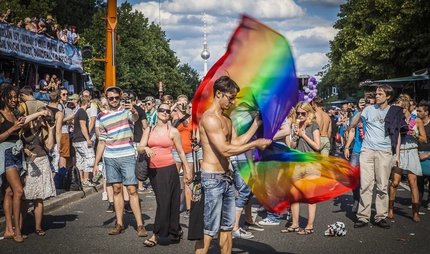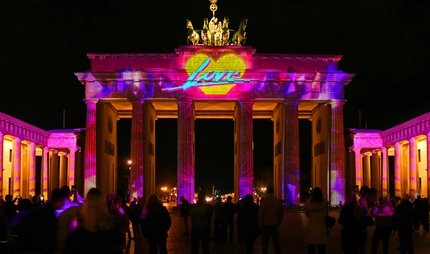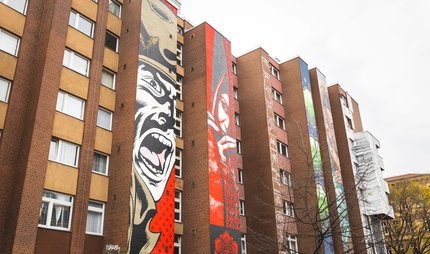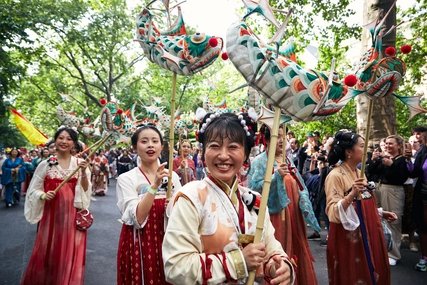
"All free men, wherever they may live, are citizens of Berlin, and therefore, as a free man, I take pride in the words: 'Ich bin ein Berliner.'" — John F. Kennedy, 1963
Berlin stands for cosmopolitanism and tolerance – for freedom, diversity, and a touch of colourful chaos.
Sure, not everything runs perfectly in the capital, but Berlin continues to be a magnet for bold ideas, fresh business models, creatives, changemakers, and free spirits. Young people in particular are drawn to its energy.
According to the Office for Statistics, people from around 170 different nations live together across Berlin’s 12 districts. The mix is especially vibrant in Wedding and Neukölln, but all over the city – and especially now – Berlin is sending a clear message: openness and tolerance matter. A city full of colour and contrasts – enjoy exploring!
Tip 1: Celebrate Berlin's diversity at the Carnival of Cultures
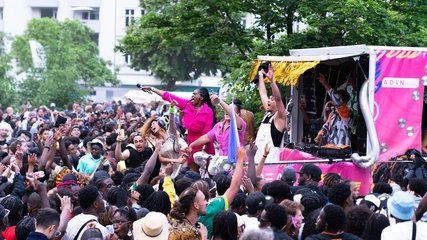
When Berlin celebrates a Festival of Diversity, it's at the Carnival of Cultures! For four days, Kreuzberg is transformed into a colourful stage of world cultures - with music, dance, culinary delights and a parade that radiates pure joie de vivre. Over 70 groups present their cultural roots with elaborately designed costumes and performances at the large street parade. International delicacies, live acts and a creative children's programme await you at the street festival.
The carnival is not just an event, but a living sign of tolerance, respect and cohesion in our city. Come along, dance and experience how diverse Berlin really is!
When: 6 - 9 June 2025, all day
Where: Blücherplatz & surroundings, Berlin-Kreuzberg
Street parade: 8 June, from 12.00 pm. June, from 12 noon | Frankfurter Allee/Karl-Marx-Allee
Tip 2: Demonstrate for love and freedom at Christopher Street Day

Berlin is not only open to other cultures: Every year at the end of July, hundreds of thousands celebrate their right to individuality, equality and self-determination in Berlin - loud, proud and full of colour. Originally founded in New York, Christopher Street Day is the most prominent LGBTQ+ event in Berlin, sending a powerful message against discrimination and exclusion. This year, the parade takes place on 26 July 2025. Join in and celebrate the freedom to be exactly who you are!
Berlin’s hospitality scene is also making a statement: the pink pillow Berlin Collection, with over 60 participating hotels, stands for openness, respect, and inclusion – proudly welcoming queer guests with the motto: Come as you are!
Tip 3: Experience interreligious dialogue in the House of One

Three religions, one house - the House of One on Petriplatz in Berlin-Mitte is unique in the world. A sacred place is being created here where Jews, Christians and Muslims can pray, discuss and learn from each other under one roof. The synagogue, the church and the mosque are architecturally independent, but connected by a central meeting space.
You can already get to know the project through guided tours, events and dialogue formats. It symbolises peaceful coexistence in a diverse city - open to everyone who wants to approach each other with curiosity and respect. Come along and set an example together for tolerance, respect and dialogue.
When: Events & guided tours to be announced
Where: Petriplatz, Mitte
Tip 4: Kreuzberger Himmel - an integrative restaurant

Kreuzberger Himmel shows just how enriching cultural diversity can be. Here you can enjoy freshly prepared Syrian specialities every day, with a Berlin twist of course. The special thing about this restaurant, however, is that it is run by refugees.
People from four nations who speak six different languages are currently working together here - and have the opportunity to arrive in Berlin and develop further. Because careers start in Kreuzberg heaven: founded in 2018 by the association "Be an Angel", the restaurant shows that integration is a win-win situation for everyone. Just have a look. Part of the 60 seats in the restaurant is also a long table where you can eat, drink and toast to community and diversity with 30 other guests.
Where: Yorckstraße 89, Kreuzberg
When: Tuesday to Saturday from 4 pm
Tip 5: City tours with open perspectives
Multaka: Meeting point museum

Multaka is a term from Arabic and refers to the exchange of cultural and historical experiences. The Berlin project Multaka trains Syrian and Iraqi refugees to become museum guides so that they in turn can guide other Arabic-speaking refugees and guests through the museum and cultural world of Berlin in their native language. The guided tours were so successful that all participating museums now also offer special German and English tours on request (e.g. at info@multaka.de).
Free guided tours in Arabic and Persian are offered every Sunday at 4 pm in the following museums:
- Bode-Museum
- Old Museum (Collection of Classical Antiquities)
- Neues Museum (Egyptian Museum and Papyrus Collection, Museum of Prehistory and Early History)
Querstadtein

In the tours of Querstadtein you will get to know the city from a completely different perspective. The tours are led by formerly homeless people who talk about their lives on Berlin's streets and park benches and show you places in public spaces where they used to live. The aim is to create more tolerance and stimulate discussion. Since this year, there have also been city tours focussing on migration stories. By the way: 100,000 people have already taken part in Querstadtein's guided tours so far.
Decolonial city tours
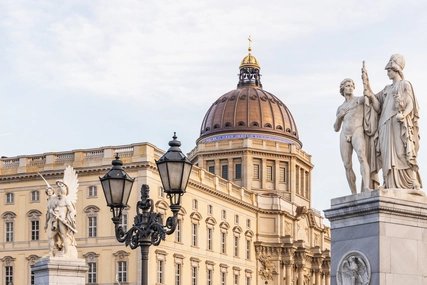
The decolonial city tours, you will discover Berlin from a different perspective - and with a view of the colonial traces in the cityscape. Whether you question the history of the top sights in Berlin's centre, take a museum tour of the Humboldt Forum and critically debate the reconstruction of the palace, in the African Quarter in Wedding you can learn exciting stories about courageous resistance fighters:Inside or on a tour of queer feminism to find out how black feminism differs from white feminism, you are sure to broaden your horizons.
The tours are led by guides who are committed to post-colonialism and critical of racism, who not only provide information but also invite you to exchange ideas.
Let your drag queen guide you through the Nollendorfkiez

Join a real Berlin drag queen on this tour and immerse yourself in the eventful history of Nollendorfplatz in Schöneberg. Discover one of the most important queer places in Berlin, learn more about the current scene, but also about the history. Visit legendary places from the 1920s such as the famous Eldorado or the house where Christopher Isherwood wrote his Berlin novels. Visit cafés, bars and memorials that make queer life visible yesterday and today. The tour not only highlights historical milestones, but also shows how vibrant the LGBTQ+ community is today. And of course there's a tasty surprise or two.
Eat the world: Culinary-cultural city tours

Eat your way around the world in Berlin. Chinese, Italian or Korean dishes are served alongside cultural insights into multicultural Berlin. The tour organisers of eat the world skilfully combine Berlin's international flair with local flavours. It goes through Wedding, Kreuzberg, Charlottenburg, Schöneberg, Wilmersdorf or Prenzlauer Berg, each with a focus on culinary diversity, sometimes sweet, sometimes savoury - from Berlin currywurst to international delights. Find out how cosmopolitan your city is - and discover a few new places in the process. This is what Berlin tastes like!
Tip 6: Feast your way through the variety of Kreuzkölln's weekly markets

With their multicultural diversity, the weekly markets on Neukölln's Maybachufer are reminiscent of an oriental bazaar. Here you can find vegetables, fabrics and Turkish specialities. Every Saturday, the art and design market "Neuköllner Stoff" invites you to browse. Traders from all over the world offer their handicrafts and culinary delights here. And in the Markthalle Neun you can eat your way around the world. Especially recommended is the "Street Food Thursday", every Thursday from 5 to 10 pm.
Tip 7: Discover queer history at the Schwules Museum
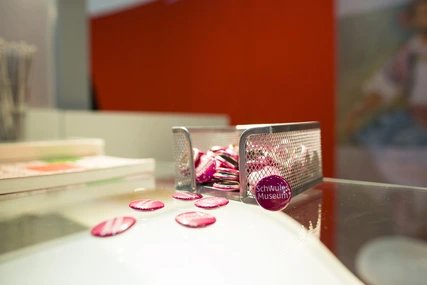
The Schwules Museum is much more than an exhibition venue - it is a living archive of queer history and identity. Since 1985, the museum has been dedicated to the visibility and diversity of the LGBTQ+ community and is now one of the most important institutions of its kind in the world. In addition to changing exhibitions of queer artists from all over the world, you can expect exciting guided tours through the museum and Berlin's queer neighbourhoods and delve deeper into the local stories. You can also network and get smart at workshops, writing, theatre and research projects. Be inspired, educate yourself - and celebrate queer culture in all its facets!
Tip 8: Enjoy coffee and cosmopolitan community at Refugio

While you're in Neukölln, why not pop into the Café Refugio as well? Here you can experience living cosmopolitanism - and enjoy a great view of Neukölln from the roof garden at the same time. The Refugio is a project of the Berlin City Mission. Here 35 people from nine different cultures live and work together on six floors. The basic idea of such a "share house" originated in Africa, but also fell on fertile ground in multicultural Neukölln. The tenants living here have also been joined by a number of associations and projects that are also helping to make Berlin a little more beautiful, multicultural and cosmopolitan.
Where: Lenaustraße 4, Neukölln
When: Monday to Friday 10 am to 4 pm.
Tip 9: Enjoy Asian cuisine on a trip to Kantstraße

Like many other major cities, Berlin also has a Chinatown. So many Asian shops and restaurants have set up shop along Kantstraße that the neighbourhood is also known to Berliners as "Little Asia". A classic is the Chinese restaurant Good Friends. In addition to authentic Asian cuisine, you will also find French and Far Eastern flavours.
Tip 10: Culinary worlds meet at Restaurant Kanaan

Kanaan is the restaurant brand of Israeli entrepreneur Oz Ben David and marketing expert Jalil Debit, a Palestinian with Arab roots who comes from an established catering family. Look forward to traditional family recipes, homemade baked goods, fresh salads, hummus dishes and other vegan and vegetarian specialities that bring the taste of the Middle East to Berlin - and build a culinary bridge between Israel and Palestine. Social commitment is part of the concept for the two owners.
Where: Schliemannstraße 15, Prenzlauer Berg
When: Wednesday - Thursday: 6 - 10 pm, Friday 12 - 10 pm, Saturday & Sunday: 11 am - 10 pm
Tip 11: Discover new worlds in theses venues for literature and culture

If you are interested in other cultures, you will find numerous project rooms and libraries in Berlin where you can research everything about distant worlds or learn a foreign language.
- The Institut Français Berlin has been a meeting place for French culture since the 1950s. In addition to language courses, you can also attend theatre performances and watch films here.
Where: Kurfürstendamm 211 - The Afrika Medien Zentrum includes the editorial office of LoNam Verlag and a very comprehensive Africa library. Festivals and events are also organised from time to time.
Where: Großkopfstraße 6-7, Reinickendorf - The Czech Zentrum Berlin offers a selected cultural programme with a focus on contemporary art, music, documentary film, literature, design and architecture.
Where: Wilhelmstraße 44, Mitte - The America Memorial Library is one of the largest libraries in Berlin. It is considered a symbol of freedom of education and freedom of expression and was given to the people of Berlin by the USA after they survived the blockade (1948/1949) by the Soviet Union.
Where: Blücherplatz 1 A, Friedrichshain-Kreuzberg
If you want to know what's currently going on in Berlin, take a look at our Events calendar.

